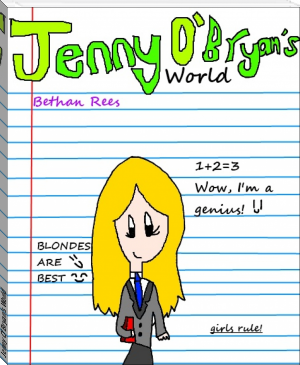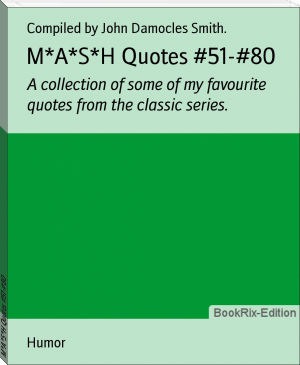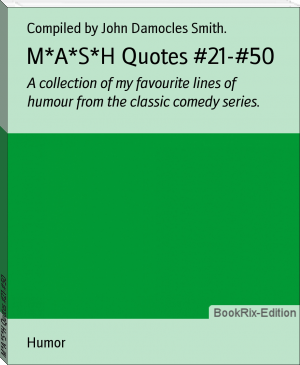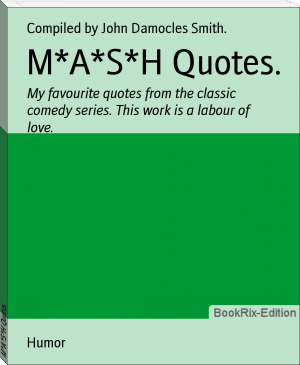The History and Records of the Elephant Club by Doesticks and Underhill (android based ebook reader TXT) 📗

- Author: Doesticks and Underhill
Book online «The History and Records of the Elephant Club by Doesticks and Underhill (android based ebook reader TXT) 📗». Author Doesticks and Underhill
"That is more than I can say," was Boggs's response. "I have known him by sight for years, and he has always appeared the same. He belongs to a class of beings in New York, a few specimens of which are familiar to those who frequent the principal thoroughfares, and are known by the ornithological appellation of "gutter-snipes." I have often talked with him, but he knows nothing of his own history; or, if he does, chooses not to reveal it. He is a monomaniac, but perfectly harmless, and calls himself Nicholas Quail. I have learned from other sources a few facts of his history. He sleeps anywhere and everywhere, and eats in the same localities. Nobody ever harms him, all being familiar with his whims. As far as I can learn, he was formerly a raftsman. He has never in his life owned real estate enough to form the site for a hen-coop, nor timber sufficient to build it. His personal property could be crowded into a small pocket-handkerchief; but let him get four inches of whisky in him, and he fancies he has such boundless and illimitable wealth, that in comparison,[Pg 58] the treasures of Aladdin, provided by the accommodating slave of the lamp, would be but small change. He walks about the streets viewing what he terms the improvements he is making; he gives all sorts of absurd directions to workmen as to how he desires the work to be done, much to their amusement. But here he is, now; if he is tight we'll have some sport."
As the personage approached, Boggs accosted him, when the following dialogue took place.
"So Nicholas," said Boggs, "you've come back, have you? How is the financial department at present?"
Nick looked up and smiled.
"The fact is," said he, "I've just been buying all the grain in Michigan, Wisconsin, Ohio, and Indiana for $7 a bushel, and I am rather short for small change, but if you want a hundred thousand or so, just send a cart round to my office. Would you prefer having it in quarter eagles or twenty dollar pieces?"
"Well, Nick, I don't care to borrow at present, but a boy says you've been drunk. How is it?"
"What boy is it?"
"Your boy in your counting-room—the urchin who runs on errands for you, smokes your stubs, and pockets the small change."[Pg 59]
"Now, hadn't he ought to be ashamed of himself, the red-haired devil, for getting Old Nick into such a scrape by his drunken lies? Haven't I made him presents enough? It was only last week that I gave him a house in Thirty-second street, and a splendid mansion on the North River; and on the 4th of July he had fourteen thousand dollars, all in pennies, to buy fire-crackers and soda-water with; and yet he goes to you and lies, and says that I've been drunk. Don't you believe the lying cub; he's got a spite agin me, because last night I wouldn't give him the Erie Railroad to bet on poker; but I couldn't do it, General; I seen the cards was agin him; the other feller held four kings, and he hadn't nothin' in the world but three high-heeled jacks and a pair of fours."
"I do believe you were drunk," said Boggs, "and if you ever get hauled up before the justice you will have to pay ten dollars, and if you have not that decimal amount handy, you had better entrust it to the boy's keeping, to have it ready in case of such an emergency."
Nick felt in his pockets, and with a puzzled air remarked:
"I haven't got the money here, but I'll give you a check on the Nassau Bank for a thousand, and you can give me the change; or I'll give you a[Pg 60] deed of Stewart's, or a mortgage lien on the Astor House."
"Shan't do it, shan't do it, Old Nick; and I'm afraid you'll have to go to Blackwell's Island, sure."
"There's that infernal island again," said Nick; "if I'd ever thought it would come to this, I never'd have given that little piece of property to the city; but I'll buy it back next week, and use it hereafter for a cabbage garden; see if I don't."
By this time the Elephants seemed to disposed to go, but Nick spied on the shirt-front of Mr. John Spout a diamond pin, which seemed to take his fancy. He offered in vain a block of stores in Pearl street, the Custom-House, the Assay-Office, the Metropolitan Hotel and three-quarters of the steamer Atlantic, and to throw into the bargain Staten Island and Brooklyn City; but it was no use, the party took their leave, and Nick was disconsolate.
Passing up Broadway, their attention was attracted by one of those full-length basswood statues of impossible-looking men, holding an impracticable pistol in his hand, at an angle which never could be achieved by a live man with the usual allowance of bones, but which defiant figure was evidently intended to be suggestive of a shooting-gallery in the rear.[Pg 61]
Mr. John Spout, who was in a philosophic mood, remarked that it was a curious study to observe the various abortive efforts of aspiring carpenters to represent the human form divine, in the three-cornered wooden men, which stand for "pistol-galleries;" and the inexplicable Turks, the unheard of Scotchmen, and the Indians of every possible and impossible tribe, which are supposed to hint "tobacco and cigars."
The ambitious carpenter first hews out a distorted caricature of a man, which he passes over to the painters to be embellished. By the time the figure has survived the last operation, it might certainly[Pg 62] be worshipped without transgressing any scriptural injunction, for it certainly looks like nothing in "the heavens above, the earth below, or the waters under the earth." It is, however, an easy matter to distinguish the Highlanders from the Turks, by the fact, that the calves of their legs are larger around than their waists, and they are dressed in petticoats and plaid stockings; the Turks and Indians, however, being of the same color, might easily be confounded, were it not for the inexplicable circumstance that the former are always squatting down, while the latter are invariably standing up; they are all, however, remarkable for the unstable material of which their countenances are manufactured; after one has been exposed to the boys and the weather for about a fortnight, his nose will disappear, his lips come up a minus quantity, the top of his head be knocked off, and a minute's scrutiny will generally disclose the presence of innumerable gimlet-holes in his eyes. The boys, in their desire to comprehend perfectly the internal economy of these human libels, not unfrequently carry their anatomical investigations to the extent of cutting off a leg or two, and amputating one or more arms, or cutting out three or four ribs with a buck-saw or a broad-axe. Indeed, there is one unfortunate wooden Indian, of some fossil and[Pg 63] unknown tribe, on exhibition in front of a snuff-shop in the Bowery, who has not only lost both legs, one arm, and his stomach, but has actually endured the amputation of the head and neck, and bears a staff stuck in the hole where his spine ought to be, and upon a flag is inscribed the heartless sentence, "Mrs. Miller's Fine Cut—for particulars inquire within."
Mr. John Spout having concluded his explanatory remarks, the entire party went into the pistol-gallery before-mentioned, to have a crack at the iron man, with the pipe in his mouth.
The nature of Mr. Quackenbush's profession, that of a teacher, was not such as would make him familiar with the use of fire-arms, and, in point of fact, he had about as good a notion of pistol-shooting as a stage-horse has of hunting wild bees; but he resolved to try his hand with the rest. When it came to his turn to try, he spilled the priming, and fired the hair-trigger instrument, accidentally, four times, to the imminent danger of the bystanders, before he could be taught to hold it so that it wouldn't go off before he got ready. He finally got a fair shot, and succeeded in breaking a window immediately behind him, after which he concluded he would not shoot any more.[Pg 64]
As the other side of the room was used for a bowling alley, the company proceeded to have a game of ten-pins; and here, again, Mr. Quackenbush distinguished himself. After dropping one ball on his toes, and allowing another to fall into a spittoon, he succeeded in getting one to roll down the alley; with his second ball, by some miraculous chance, he got a "ten-strike," knocking down, not only all the pins, but also the luckless youth who presided over the setting-up-department.
Having refreshed themselves, the party once more regained Broadway, and consulted as to what place should be visited next.
Mr. Spout suggested that he would like to smoke. Nobody dissented except Mr. Dropper, who said he had read the day previous, in the morning papers, that a Turkish elephant had arrived in town, and was on exhibition on Broadway, above the Metropolitan Hotel. Thinking that a comparison instituted between the Turkish quadruped and the one which it was their particular office to study, might be of benefit to the members of the club, in their investigations, Mr. Dropper suggested that the smoking be dispensed with, until they should come into the presence of the oriental animal. Onward the zoölogical specialists sped their way, sometimes[Pg 65] marching in Indian file, and sometimes arm-in-arm, running over little boys, dirty dogs, drygoods boxes, low awnings and area railings, until at last Mr. Dropper cried "Halt!" before the portals of the den wherein the mysterious elephant, which had arrived from Constantinople, was concealed. It became a question who should lead in making an entrance. Boggs was fearful, Van Dam was afraid, Spout was cautious, Quackenbush would a little rather not, but Dropper's courage failed not, and he walked boldly into the outer temple, followed by his timid associates. Here they discovered a long counter, and a glass show-case, in which were displayed queer shoes, quaint tooth-picks, funny pipes, and singular ornaments. A glass jar, filled with a rose-pink fluid was also on the counter. A tall gentleman with a ferocious moustache, and a diminutive red cap, without a front-piece, met them. Mr. Quackenbush's curiosity was in a single direction; he said he wanted to go through the harem. They finally entered into the rear apartment. Here their wondering eyes beheld a long room, well lighted with gas. In the centre was a small basin, in which goldfish were indulging in their accustomed aquatic sports. On either side were arranged wide divans, covered with red drapery and high pillows. Small[Pg 66] stands were arranged in front of them. Various parties were seated with novel inventions before them, suggested by the minds of ingenious Turks, to accomplish the destruction of the tobacco crop. The members of the Elephant Club placed themselves on the divans, and after they had arranged themselves to their satisfaction, their oriental friend approached them, and gave to each a "programme" of Turkish delicacies. Mr. Spout inquired what a nargillê was, and was informed that it was a water-pipe. Mr. Spout insisted that he preferred a pipe wherein fire, rather than water, was the element used. Mr. Boggs said he would take a chibouk on trial. Mr. Spout coincided, and called also for a chibouk. But Van Dam ordered three nargillês, one for himself, another for Dropper, and a third for Quackenbush. The chibouks were produced, and Boggs and Spout commenced smoking in earnest.
In the mean time, the nargillês were produced for the other members of the club. Van Dam backed down at their first appearance. The glass vase, having in it water below and fire above, looked suspicious, and added to that was a mysterious length of hose, which was wound about in all directions, commencing at the fire, and running around the vase, about the table legs, over the chair, back through[Pg 67] the rounds, about his legs, around his body, and finally came up over his shoulder, and terminated in a mouth-piece. Mr. Van Dam's first sensations, after these preliminaries had been arranged, were that he was in imminent danger of his life, and acting upon this impulse, he obstinately refused to go the nargillê, remarking, that they might be harmless





Comments (0)